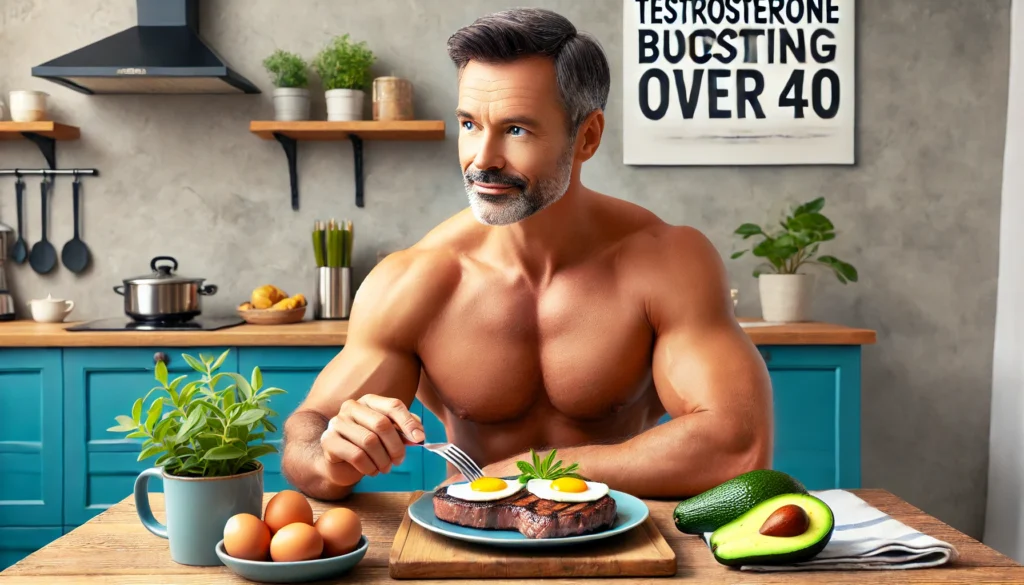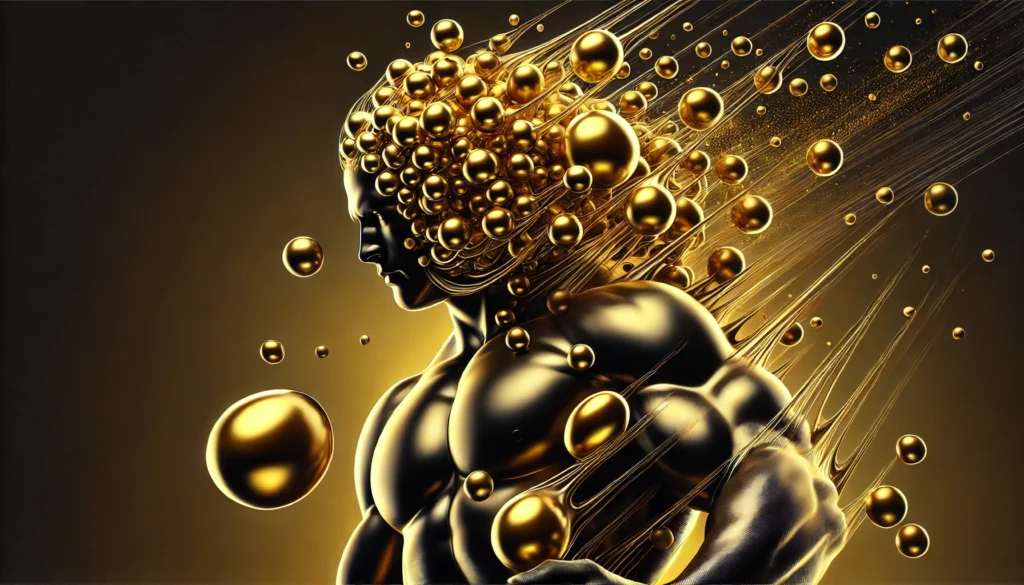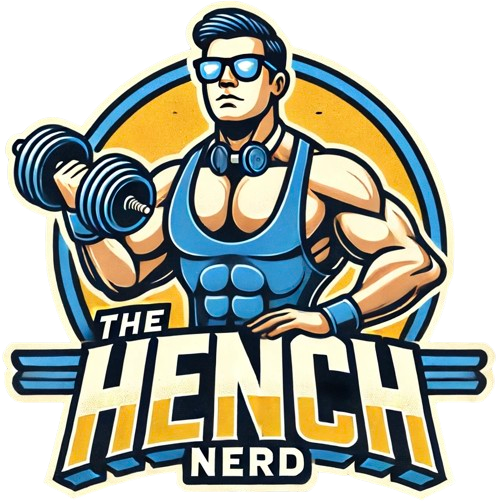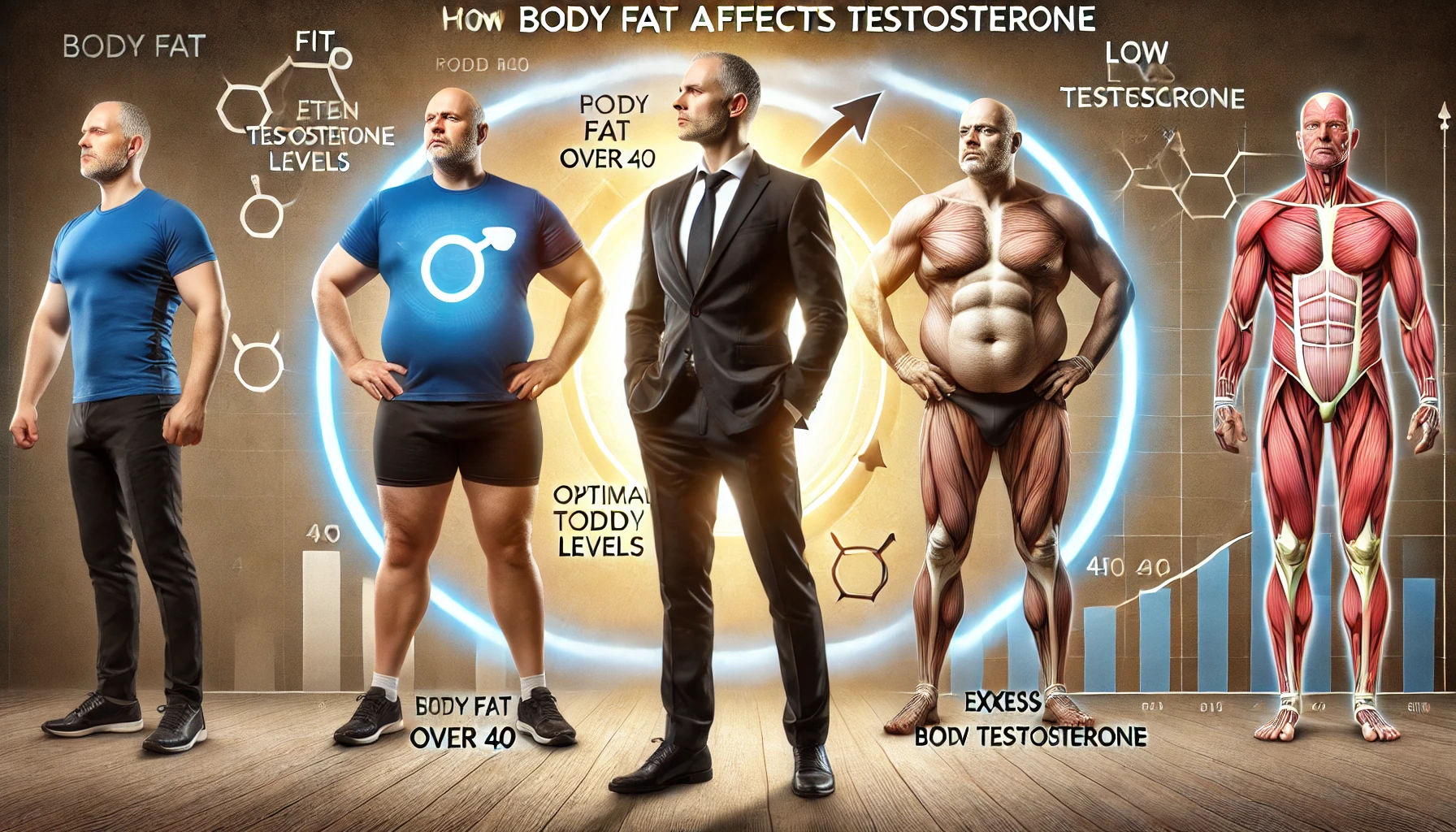How does body fat affect testosterone? Massively. one of the largest actions you can take to increase testosterone is to get lean. Do read on.
Have you ever wondered how your body fat might be messing with your testosterone levels? Well, you’re not alone. Many men don’t realise that carrying too much fat could be the root cause of their declining testosterone. The relationship between fat and testosterone is clear: as body fat increases, testosterone levels decrease, thanks to the increase in oestrogen production. It’s a vicious cycle that’s hurting men’s health in more ways than one. But here’s the good news—if you’re in that 11-17% body fat range, you’re in a sweet spot for maintaining optimal testosterone levels. if you haven’t checked out my post on how can you raise testosterone levels naturally, I’d recommend you take a look.
In this article, we’ll dive deep into how body fat affects testosterone and why losing fat is essential for improving your hormone health. You’ll discover how your diet plays a crucial role in testosterone production, the critical importance of saturated and monounsaturated fats, and why certain fats are downright harmful. We’ll also debunk some major myths about cholesterol and low-fat diets that are sabotaging men’s health.
You can check out my pillar post on raising my testosterone levels for more comprehensive insight into naturally raising testosterone via losing body fat. You can also find extensive articles within my fat loss and nutrition section.
Key Takeaways: How Does body Fat Affect testosterone?
- Body fat levels between 11-17% are ideal for testosterone production, while excess fat leads to increased oestrogen and reduced testosterone.
- Saturated and monounsaturated fats are crucial for supporting testosterone, while polyunsaturated and trans fats are detrimental.
- Cholesterol is essential for testosterone production, and the demonisation of cholesterol is based on outdated and flawed research.
- Low-fat diets harm testosterone levels, leading to low energy, mood swings, and weight gain.
- A high-fat, moderate-protein, low-carb diet is optimal for fat loss and testosterone health.
Why Optimal Body Fat Matters for Testosterone
if you’re thinking of going on T (TRT), I urge you to read the below and check out my entire section on increasing testosterone naturally. Get your lifestyle in order and you won’t have to!
Let’s start with the basics: why is there an optimal body fat range for testosterone production? Studies show that men with 11-17% body fat experience the best testosterone production. When your body fat creeps up above 20%, you begin to see a drop in testosterone and a rise in oestrogen. This is because excess fat, particularly visceral fat around your belly, actively produces oestrogen, which suppresses testosterone.
Carrying too much fat doesn’t just lower your testosterone; it can lead to type 2 hypogonadism. In simple terms, your body is still producing testosterone, just not enough. This is common in men today due to poor diet and lifestyle choices leading to weight gain. The more fat you carry, the more your body converts testosterone into oestrogen through a process called aromatase. This enzyme, found in fat tissue, essentially turns your testosterone into the very hormone that feminises you.
So, how do you turn the tide? Simple—lose fat.
The Testosterone-Boosting Power of Fat Loss
Fat loss isn’t just about getting ripped; it’s about reclaiming your health. When you shed fat, you lower your aromatase activity and reduce oestrogen production, allowing your free testosterone levels to rise. This has a direct impact on your energy levels, libido, muscle growth, and overall well-being.
A study published in the Journal of Clinical Endocrinology found that men who lost just 10% of their body weight saw a significant increase in testosterone levels. The researchers concluded that fat loss, especially around the abdomen, helps restore hormonal balance by reducing the oestrogenic effects of fat tissue.
What’s more, fat loss improves the function of your Leydig cells, which are responsible for producing testosterone in your testes. By reducing the oxidative stress caused by excess body fat, these cells can function more efficiently, leading to higher testosterone production.
Fats—The Key to Supporting Testosterone Production

You’ll find more information on fats and what foods increase testosterone within the accompanying article.
Now, let’s talk about diet. Contrary to what mainstream advice might have told you, fats are not the enemy. In fact, they’re vital for your testosterone levels. But not all fats are created equal. To optimise testosterone, you need to focus on consuming the right kinds of fats—namely saturated fats and monounsaturated fats.
Saturated Fats: A Testosterone Booster
For years, saturated fats have been demonised by the media, but the truth is they are crucial for testosterone production. Saturated fat is essential for creating cholesterol, which serves as the precursor for testosterone. Without cholesterol, your body simply can’t produce enough of this important hormone.
Dr. Jeff Volek, a leading researcher on low-carbohydrate diets, explains: “Saturated fats, in particular, help stimulate the production of anabolic hormones, including testosterone.” In other words, if you cut saturated fats from your diet, you’re cutting your testosterone production.
Monounsaturated Fats: A Friend to Hormonal Health
Monounsaturated fats, found in avocados, olive oil, and nuts, are just as important for your hormone health. These fats support testosterone production by improving your body’s insulin sensitivity and reducing inflammation. High inflammation levels can lower testosterone, but monounsaturated fats help combat that issue, allowing your body to maintain steady testosterone levels.
A study published in the American Journal of Clinical Nutrition found that men who followed a diet rich in monounsaturated fats had significantly higher testosterone levels than those who ate a diet high in polyunsaturated fats.
The Dangers of Polyunsaturated and Trans Fats for Testosterone
While saturated and monounsaturated fats support testosterone, polyunsaturated fats—especially omega-6 fatty acids—have the opposite effect. These fats, commonly found in vegetable oils, seed oils, and processed foods, increase inflammation and oxidative stress in your body, which damages testosterone production. Worse yet, trans fats, found in fast foods and baked goods, are outright toxic to your hormones.
Dr. Andrew Weil, a pioneer in integrative medicine, states: “Trans fats are directly linked to lower testosterone levels and increased abdominal fat.” These fats promote insulin resistance and weight gain, both of which suppress testosterone production.
So, if you want to maintain healthy testosterone levels, avoid foods high in polyunsaturated and trans fats at all costs.
Cholesterol: The Misunderstood Ally for Testosterone

For years, we’ve been told that cholesterol is the enemy of good health. However, this couldn’t be further from the truth when it comes to testosterone. Cholesterol is the very building block of testosterone. Without it, your body simply can’t produce the hormone.
The infamous Ancel Keys study that blamed saturated fat and cholesterol for heart disease has since been debunked. Keys cherry-picked data to fit his theory, and his conclusions led to decades of misguided dietary advice. In reality, cholesterol is essential for hormone production, including testosterone.
a very sad legacy is that you’ll blow peoples minds when explaining this key fact. I’ve been following a higher fat and lower carb/sugar diet for years and have never felt better/effortlessly stay lean. Most of my family unfortunately think I’m a heart attack waiting to happen.
A study from the Journal of Andrology found that men who consumed more dietary cholesterol had significantly higher testosterone levels than those who avoided cholesterol-rich foods. Moreover, men on low-cholesterol, low-fat diets tend to experience a drop in testosterone, which negatively impacts their energy, mood, and ability to build muscle.
Low-Fat Diets: The Silent Killer of Testosterone
One of the biggest mistakes men make when trying to improve their health is adopting a low-fat diet. While it might seem like a healthy choice, cutting out fats—especially saturated and monounsaturated fats—is a disaster for your testosterone levels.
Low-fat diets deprive your body of the raw materials it needs to produce testosterone. As a result, men on low-fat diets often experience symptoms of low testosterone, such as low libido, fatigue, and weight gain. Worse yet, these diets can lead to insulin resistance, which further suppresses testosterone production.
A study published in the Journal of Steroid Biochemistry found that men who followed low-fat diets had a 12% reduction in testosterone levels after just six weeks. In contrast, those who consumed higher amounts of dietary fat saw their testosterone levels rise significantly.
Optimising Your Diet for Testosterone
If you want to lose fat and boost your testosterone, a high-fat, low-carb diet is your best bet. This doesn’t mean you need to follow a strict ketogenic diet, but cutting out processed carbohydrates, sugars, and grains can have a huge impact on your hormone levels.
How To Lose Body Fat For Increased Testosterone?
For a simple fat loss plan:
- Take your current weight in lbs
- Multiply by 12
- This is your total calorie allowance for the day
- Eat 50% of your diet from good fats listed above, 25% from protein and 15% or lower from carbohydrates (go higher in fat if you’re going lower in carbs)
- Walk 10,000 steps per day and resistance train 3 x a week (you’ll find more advice within my general fitness and muscle building sections)
Protein for Retaining Muscle Mass

Along with fats, consuming moderate protein is essential. Aim for around 1g of protein per pound of lean body mass to retain muscle while losing fat. Maintaining muscle mass is critical because muscle helps regulate insulin sensitivity, which in turn supports healthy testosterone levels.
If you want to go a layer deeper and understand how micronutrients impact testosterone levels, I have you covered.
Here are some FAQs crafted in Mark’s conversational and informative style, designed to provide clarity and value for the article:
FAQs: How Does Body Fat Affect Testosterone?
1. Why does body fat lower testosterone levels?
Excess fat, particularly visceral fat, produces an enzyme called aromatase, which converts testosterone into oestrogen. This hormonal imbalance reduces testosterone, affecting energy, mood, and overall health.
2. What is the optimal body fat range for testosterone production?
The ideal range for testosterone production is 11-17% body fat, where hormonal balance is maximised. Once body fat exceeds 20%, testosterone declines, and oestrogen levels rise.
3. Can losing body fat really boost testosterone levels?
Yes, losing fat reduces aromatase activity and decreases oestrogen production, allowing testosterone levels to rise. Studies show that losing just 10% of body weight can significantly increase testosterone.
4. Why is visceral fat worse than other types of body fat?
Visceral fat disrupts hormonal balance by producing more oestrogen and reducing testosterone. It also increases inflammation and oxidative stress, compounding the effects on hormone health.
5. What’s the best diet for fat loss and testosterone health?
A high-fat, moderate-protein, low-carb diet is ideal. Focus on saturated and monounsaturated fats, while avoiding harmful trans fats and processed carbohydrates.
6. Are low-fat diets bad for testosterone?
Absolutely. Low-fat diets deprive your body of essential nutrients needed for testosterone production, often leading to symptoms like fatigue, low libido, and weight gain.
7. What kinds of fats boost testosterone levels?
Saturated fats (from meat, eggs, and dairy) and monounsaturated fats (from avocados, olive oil, and nuts) are essential. Avoid polyunsaturated fats and trans fats, as they lower testosterone.
8. Is cholesterol really necessary for testosterone production?
Yes, cholesterol is the precursor to testosterone. Without sufficient cholesterol, your body cannot produce testosterone effectively. Forget the outdated myths—cholesterol is vital for hormone health.
9. How does exercise affect testosterone and fat loss?
Regular strength training and HIIT naturally boost testosterone by reducing body fat, improving insulin sensitivity, and stimulating testosterone production.
10. Can walking help with fat loss and testosterone?
Yes, walking 10,000 steps a day helps burn fat and reduce stress, both of which support testosterone levels. Combine walking with resistance training for even better results.
11. What role does protein play in maintaining testosterone?
Protein supports muscle mass, which regulates insulin sensitivity and aids testosterone production. Aim for 1g of protein per pound of lean body mass during fat loss.
12. Are there any fats or foods I should avoid?
Avoid trans fats (found in fast foods and baked goods) and limit polyunsaturated fats (from vegetable oils). Both promote inflammation and lower testosterone levels.
13. How can I check my body fat percentage?
Use a body composition scale, skinfold calipers, or consult a fitness professional. Staying in the 11-17% range is ideal for maintaining healthy testosterone levels.
Conclusion
To achieve optimal testosterone levels, managing your body fat and focusing on a nutrient-rich diet are key. Ignore the mainstream advice pushing low-fat diets and embrace the power of saturated fats, cholesterol, and low-carb eating. By losing excess fat and fuelling your body with the right nutrients, you can restore your testosterone levels and feel like yourself again.
Chat Soon,
Matt


I think the admin of tis web site is truly working ard iin support of his
web site, since here every data is quality based stuff. https://ttzhan.com/thread-6054-1-1.html
I think the admin of this web site is truly working
hard in support of his weeb site, sincee here every data is quality based stuff. https://ttzhan.com/thread-6054-1-1.html
I don’t even know how I ended up here, but I thought this post was great.
I don’t know who yoou are but definitely you’re going to
a famous blogger if you are not already 😉 Cheers! https://livsmartsolar.in/blog/how-to-write-a-thesis-a-step-by-step-guide-with-tips-7/
ah thanks for the kind words 🙂
I don’t even know how I enmded up here, but I thought this post was great.
I don’t kniw who you are butt definitely you’re going to a famous blogger
if you are not already 😉 Cheers! https://livsmartsolar.in/blog/how-to-write-a-thesis-a-step-by-step-guide-with-tips-7/
After loooking ovver a few of the articles on your web page, I
seriously appreciate your way of writing a blog. I added it to my bookmark webpage list and will be checking back in the near future.
Take a look at my website too and let me know what you think. https://99baba.com/user/profile/163693
ah thanks so much
After looking over a few of the articles on your web page, I seriously appreciate your way of writing a blog.
I addded it to my bookmark webpage list and
will be checking back in the newar future. Take a look at my websikte too and let me know what you think. https://99baba.com/user/profile/163693
I blog quitfe often and I seriously appreciate your content.
The article has really peaked my interest. I’m going to take a
note of your blog and keep checking for new details about once
per week. I opted in for your RSS feed as well. https://www.waste-Ndc.pro/community/profile/tressa79906983/
I blog quite often and I seriously appreciate your content.
The article hhas really peaked my interest. I’m going to take a
note of yur blog and keep checking for new details
about once per week. I opted in for your RSS feed as well. https://www.waste-Ndc.pro/community/profile/tressa79906983/